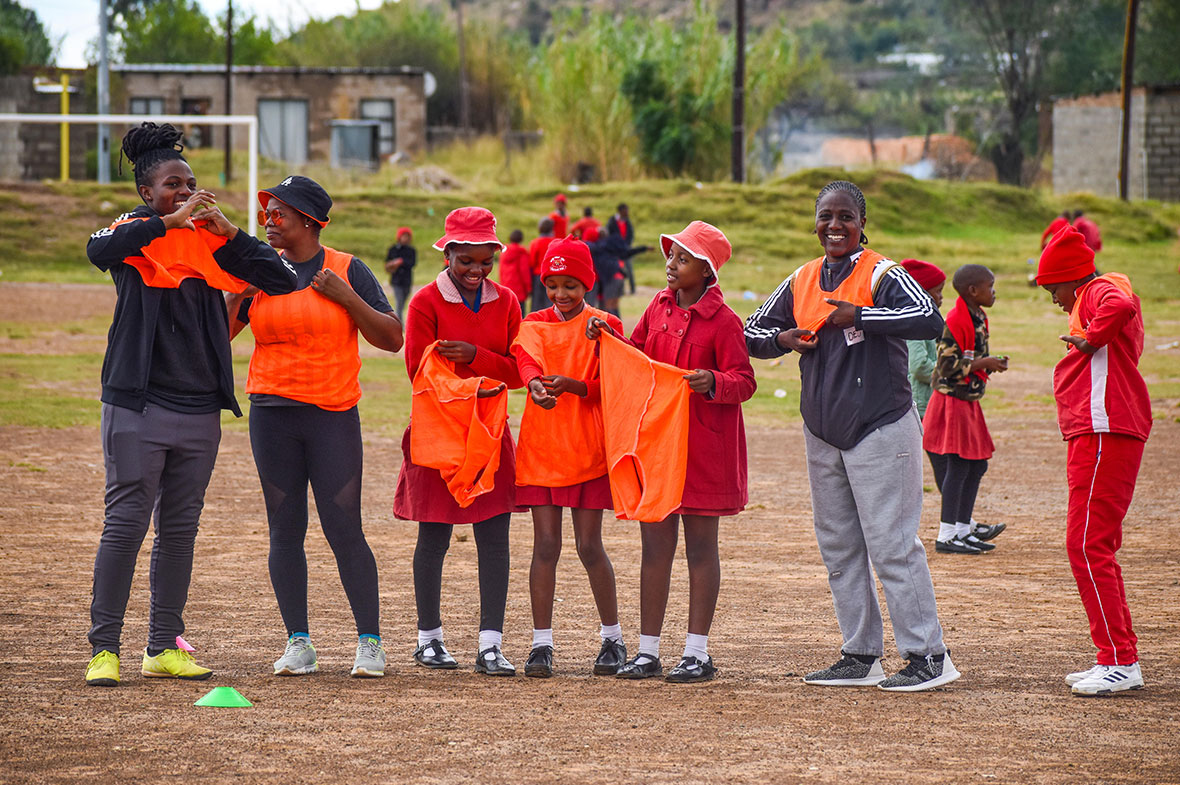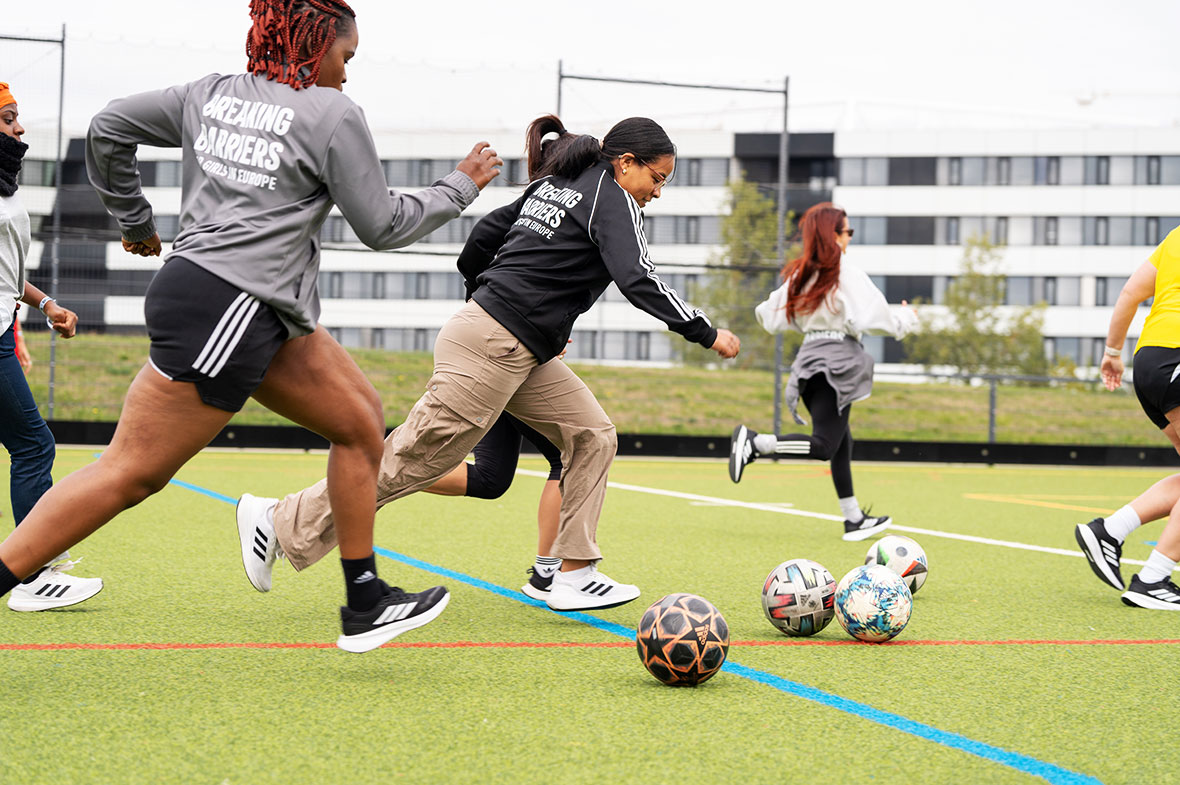Equal Play Effect - Five-Year report
A collective global effort to accelerate gender equity across football for good communities.
Read the Equal Play Effect 5-Year Impact Report
Read the Equal Play Effect 5-Años Resumen Ejecutivo
In 2020, Common Goal, Soccer Without Borders, and Women Win embarked on a ten-year mission to accelerate and maximise football’s contribution to Sustainable Development Goal 5: Gender Equality by 2030. Launched as the Global Goal 5 Accelerator, the initiative was born from a simple yet urgent realization: women and girls remain underrepresented at every level of the football ecosystem: on the pitch, on the sidelines, in the organisations and in the community and media.
What began as a collective project, has evolved into a global movement. Five years in, its impact has reshaped systems, mindsets, and leadership across continents.
“The Equal Play Effect is more than a project, more than a program, and more than any one person or organization. I have been in football across almost every level for more than 20 years, and I genuinely believe it is the world’s most substantial ground-up movement to shape a gender equal world through football.” - Mary Connor, Executive Director, Common Goal USA
This five-year report represents the halftime whistle on our ten-year collective endeavour. It is not a celebration — it is proof that the Equal Play Effect is a functioning system for gender equity, built and sustained by 101 organisations across 57 countries, powered by the collective energy, commitment, and shared intelligence of hundreds of individuals and organisations.
“What stood out to me in this evaluation was the understanding that change is incremental—and that it begins by investing in the individuals best positioned to drive gender equity. The reflections and experiences shared by 38 leaders, including 30 women, from more than 20 countries, revealed how this investment empowers individuals to influence their own spheres of impact—from their peers and partners to their national federations.” - Alex Richmond (PhD), writer and researcher “Equal Play Effect – 5-Year Report”

The Equal Play Effect treats football as infrastructure, not outreach. Where the sector once used football as a tool to achieve social goals outside the game, EPE re-engineers the systems from within. It invites participants to embed equity directly into the governance, leadership, and culture of football-for-good organisations — ensuring that structural barriers inside the game are confronted and dismantled as part of daily operations.
Over the past five years, changes to football systems across the football for good community have been built and refined from the ground up by local leaders and their organisations. That collective authorship is its defining strength — shared, adaptable, and owned by those closest to the realities on the ground.
The report shows that Equal Play Effect activates four interdependent systemic shifts — in mindset, leadership, policy and resource flow, and network capacity.
Together, these shifts create the conditions that strengthen the organizations’ positioning and the opportunity for girls, women, and non-binary individuals to lead change on and off the field. When people think, lead, govern, and connect with a shared mindset and understanding of the systemic shifts that will drive gender equity, football can be a significant contributor to a gender equal world.
When these conditions align, four “Effects” emerge: Opportunities for HER to lead Herself; Enabled environments for HER to lead her Peers, Accountability systems for HER leadership in the organisation; and established avenues for HER to lead her community.
“We believe that all girls are born leaders but they don’t have many opportunities to develop those skills. We can support them to build their confidence, learn how to use their voice and speak up from themselves." - Meg Smith, Women Win (Expert Partner), Global

Individual agency builds collective power. Peer networks reshape institutions. Institutional reform influences communities. Community transformation sets new norms for the next generation. This feedback loop is what makes the Equal Play Effect self-sustaining — a living infrastructure, not a collection of isolated projects.
The Equal Play Effect has produced measurable systemic transformation across leadership, policy, and connectivity.
“We’ve been implementing gender equity from the beginning, but these spaces give us new insights and the wisdom to know what path to take in program implementation.” - Ana Arizabaleta, SOMOS Equidad Lead
EPE has increased the proportion of women coaches and staff across the network and equipped them to serve as role models and decision-makers. This shift ensures that more girls and women can see, and become, leaders in their own communities.
Equity has been embedded into operations through the establishment of 91 Gender Action Plans across the network — long-term blueprints that make gender equity a permanent organizational norm rather than an add-on.

EPE’s distributed leadership model creates continuous feedback loops. Local innovations scale upward, while global insights translate downward into context-specific practice. This dynamic exchange enables collective acceleration across the entire ecosystem.
Together, these mechanisms ensure that progress at the individual level translates into structural power — creating enabling conditions for women and girls to lead themselves, their peers, their organisations, and their communities.
After five years, the system is working. The Equal Play Effect demonstrates that equity can be built into football’s structure — not simply championed around it.
“We joined forces for gender equality. We created a project together. Football-loving women who understood the power of being able to do many things thanks to football.” - Natalia Gaitán, Common Goal member and former Colombia National Team player
This progress has only been possible through collective action – a shared effort uniting the leadership and participation of more than 600 individuals involved in the development and implementation of Equal Play Effect, 259 individuals pledging 1% and the backing of partners such as adidas, Right to Dream, FC Nordjaelland, and GIZ. The Equal play Effect network exists because of the sum of these commitments – each contributing to a system of equity that continues to grow stronger.
The next phase is about replication, endurance, and scale. We invite all partners, practitioners, and allies to engage with the operational model that has made these results possible.
The task is no longer to fund programmes — it is to invest in a proven system that is already transforming football and the communities connected to it.
Read the Equal Play Effect 5-Year Impact Report
Read the Equal Play Effect 5-Años Resumen Ejecutivo